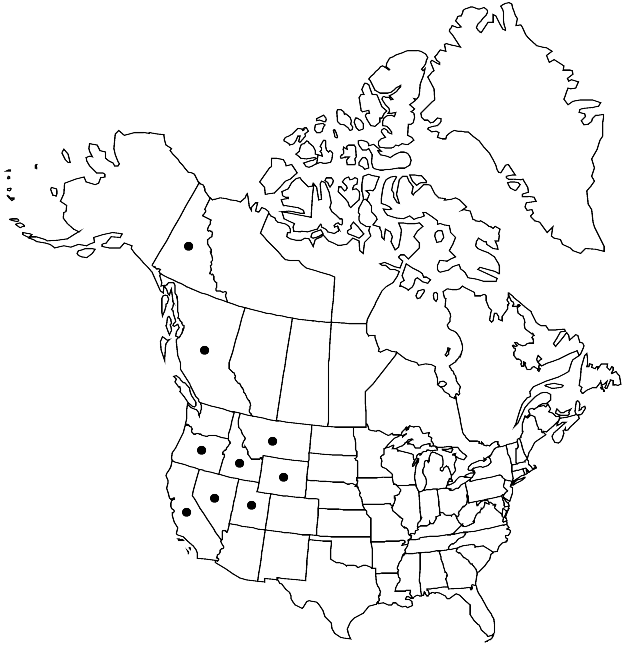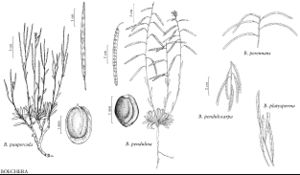Difference between revisions of "Boechera pendulocarpa"
Harvard Pap. Bot. 11: 77. 2006.
FNA>Volume Importer |
(No difference)
|
Revision as of 22:16, 26 July 2019
Perennials; short- to long-lived; sexual; caudex usually not woody. Stems usually 1 per caudex branch, arising from center of rosette near ground surface, 0.6–3 dm, densely pubescent proximally, trichomes simple and stalked, 2–4-rayed, 0.1–0.4 mm, glabrous or sparsely pubescent distally. Basal leaves: blade narrowly oblanceolate, 1.5–4(–5) mm wide, margins entire, often ciliate along petiole, trichomes (simple), to 0.6 mm, surfaces densely pubescent, trichomes short-stalked, 4–8-rayed, 0.08–0.2 mm. Cauline leaves: 6–17, sometimes concealing stem proximally; blade auricles absent, surfaces of distalmost leaves glabrous or sparsely pubescent. Racemes 4–11-flowered, unbranched. Fruiting pedicels arched, gently recurved, 3–8(–12) mm, glabrous or sparsely pubescent, trichomes appressed, branched. Flowers ascending at anthesis; sepals pubescent; petals white or lavender, 4–6 × 1–1.5 mm, glabrous; pollen ellipsoid. Fruits pendent, not appressed to rachis, not secund, usually straight, edges parallel, (2–)2.5–3.8 cm × 1.5–2.2 mm; valves glabrous; ovules 66–92 per ovary; style 0.3–0.5 mm. Seeds sub-biseriate, 1–1.2 × 0.7–0.9 mm; wing distal, 0.05–0.1 mm wide. 2n = 14.
Phenology: Flowering Apr–Jul.
Habitat: Rock outcrops and gravelly slopes in sagebrush, open conifer forests, subalpine meadows
Elevation: 1000-3300 m
Distribution

B.C., Yukon, Calif., Idaho, Mont., Nev., Oreg., Utah, Wyo.
Discussion
Though often treated as a variety of Arabis (Boechera) holboellii (e.g., R. C. Rollins 1993), B. pendulocarpa is easily distinguished from that species by having simple and 2–4-rayed (versus 4–8-rayed) trichomes proximally on stems, cauline leaves without auricles, fruiting pedicels gently (versus sharply) recurved, and shorter (2–)2.5–3.8 (versus 3.5–6.5) cm, non-secund fruits. The two taxa have allopatric distributions, with B. pendulocarpa found in the mountains of western North America and B. holboellii apparently confined to Greenland. Recent use of the name A. (Boechera) exilis for this taxon (e.g., G. A. Mulligan 1996; R. D. Dorn 2001; N. H. Holmgren 2005b) is based on misinterpretation of the type (M. D. Windham and I. A. Al-Shehbaz 2006).
Selected References
None.
